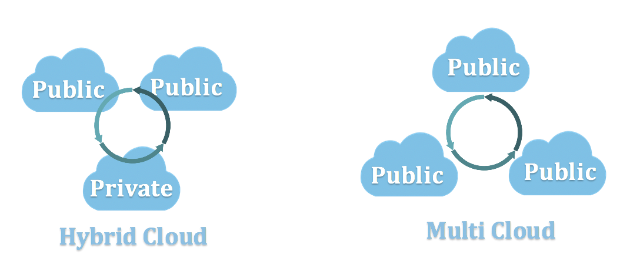
Data Security and IT Controls for Your Hybrid Multi-Cloud

There is no single solution to any problem and organizational priorities drive the trade-offs in designing the storage and compute solution. However, we believe the benefits outweigh the risks when moving from an on-premises IT architecture to a hybrid multi-cloud solution.
Most IT departments will soon adopt a multi-cloud architecture. Gartner reported in May 2019 that 81% of respondents to a public cloud survey said that they are working with two or more providers. Cloud computing is typically defined as the on-demand availability of computer system resources, especially data storage and computing power, without direct active management by the user.

Gartner states that multi-cloud computing is a subset of hybrid computing. An IT department that has placed all its compute and storage resources in one or more clouds has either a single cloud or multi-cloud architecture. If some of its resources are on premises and some are in the cloud, then it is a hybrid architecture. Leonovus defines a multi-cloud architecture as multiple cloud computing and storage services in a single heterogeneous architecture. Where the IT department retains some of their on-premises resources, the result is a hybrid multi-cloud architecture.
On-premises level data security is now a requirement in the public cloud. The information security industry has recognized that, while it is important to guard and protect the infrastructure in the IT environment, it is most critical to focus on and safeguard the data. In fact, with this data-centric protection model delivered by Leonovus Vault, corporate data is far safer and more durable in a multi-cloud architecture than in an on-premises data center. Read our whitepaper for the details.
Extending IT controls and maximizing the benefits of a hybrid multi-cloud architecture is essential. There are numerous advantages to using Leonovus software for your hybrid multi-cloud architecture.
Flexibility. Leonovus can take any data from any application and manage it in any cloud. Capacity augmentation and agility at its best. With Leonovus, you can evolve your cloud storage strategy without having to reconfigure your applications or change user behaviour.
Reduce Vendor or Cloud Lock-in. The Leonovus Vault multi-cloud data controller seamlessly manages data across the hybrid clouds and between multiple clouds, reducing data egress costs and allowing you to adopt best-of-breed storage services. The flexibility to transcend the bonds of specific storage providers gives you the freedom to benefit from ever-evolving cloud service and pricing dynamics.
Compliance. Regulatory requirements are always challenging. Leonovus’ unique ‘encrypt, shred, and spread’ technology combined as needed with Write Once Read Many (WORM) locks, true data sovereignty, and our blockchain-based data access auditing solution is a huge leap that ensures compliance in the cloud.
Risk Mitigation. Working with multiple cloud vendors helps mitigate the risk of service disruptions that may affect a single cloud provider or a local single site data center. Leonovus Vault builds on the resiliency of cloud storage to provide enhanced data durability.
There is no single solution to any problem and organizational priorities drive the trade-offs in designing the storage and compute solution. However, we believe the benefits outweigh the risks when moving from an on-premises IT architecture to a hybrid multi-cloud solution.


